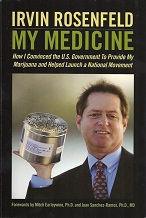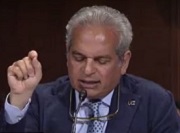US Senate Hearing: Researching the Potential Medical Benefits and Risks of Cannabis
On July 13, 2016, the United States Senate Judiciary Subcommittee on Crime and Terrorism held a hearing to review the benefits and risks of medical marijuana.
Capitol Hearings, a service of C-Span, taped the hearing (see below), “Researching the Potential Medical Benefits and Risks of Marijuana.” The hearing’s schedule of witnesses is as follows:
Panel 1 – Sens. Kirsten Gillibrand, D-N.Y., and Cory Booker, D-N.J.
Panel 2 – Dr. Susan Weiss, Ph.D., Director of the National Institute On Drug Abuse’s Division Of Extramural Research, and Dr. Douglas Throckmorton, M.D., Deputy Center Director of the Food And Drug Administration’s Regulatory Programs.
Panel 3 – Dr. Daniele Piomelli, Ph.D., Pharm.D., Professor Of Anatomy And Neurobiology at the UC-Irvine, Dr. Stuart Gitlow, M.D., Executive Director of American Society Of Addiction Medicine’s Annenberg Physician Training Program In Addictive Disease, and Mr. D. Linden Barber, J.D., Partner at Quarles and Brady, LLP.
According to NORML, this hearing follows the introduction of House Bill 5549, which would amend the Controlled Substances Act so qualified medical marijuana researchers could have access to marijuana, as well as the introduction of similar legislation in the Senate, Senate Bill 3077.
via MJNews and YouTube
Rick Simpson |The Cannabis Conspiracy, Hemp Oil Healing, & Rockefeller Medicine
Living legend, Rick Simpson, joins THC to celebrate 4/20 by exposing the truth about the mighty marijuana plant, dropping knowledge about the hemp oil "cure all" he is famous for developing, and discussing all the various ways that lifting the marijuana/hemp embargo could benefit humanity. Enjoy!
mobile medical marijuana deliveries available or grow your own at home
This is what it's like in the U.S.A and eventually will occur here in Australia, like it or not it's inevitable. So why wait Australia?
Arroyo Grande residents with medical marijuana cards could soon grow limited quantities of the plant or have it delivered to their homes.
The Arroyo Grande City Council approved an ordinance overturning its previous bans on mobile dispensary deliveries and at-home cultivation of medical marijuana Tuesday, marking an end to the city’s hard-line stance on the substance.
With the law, Arroyo Grande becomes one of the first cities in California to regulate mobile medical marijuana delivery services, city officials said.
“If it hadn’t been for people who had come to the podium, we would still be back where we were at,” Councilman Tim Brown said. “So I want to tell those people who came forward that we heard what they said, we listened to what they said, and we changed our minds based on what they said.”
The ordinance will return to the council for a second reading June 28 and, if approved as expected, will go into effect 30 days later.
The turnaround comes after the council approved an ordinance in January that banned growing medical marijuana at home, amid now unfounded concerns that the city needed a local ordinance governing cultivation or the state could take over regulatory control.
The city already had banned brick-and-mortar dispensaries in 2008 and mobile dispensaries in 2012.
"I want to tell those people who came forward that we heard what they said, we listened to what they said and we changed our minds based on what they said."
Tim Brown, Arroyo Grande city councilman
During a City Council meeting in March, several residents said those ordinances made it impossible to obtain medical marijuana within the city. An emotional plea from resident Devin Ward, who has amyotrophic lateral sclerosis (also known as ALS or Lou Gehrig’s disease) helped persuade the council to loosen the local laws.
Ward didn’t attend Tuesday’s meeting, but fellow Arroyo Grande resident Patty Welsh gave a poignant appeal on behalf of Ward and others with terminal illnesses.
“If you ask anyone what their No. 1 fear of dying is, it’s suffering,” she said. “Let more residents have access to something that might save their lives or ease their pain, because Devin Ward matters. All life matters.”
Former San Luis Obispo County Supervisor Caren Ray, who was on the City Council when it outlawed mobile dispensaries, also spoke at the meeting Tuesday to show her support for lifting that ban and approving the new regulations.
“I’m standing here tonight to basically correct a wrong,” she said. “We were wrong to have done that. I think that society has kind of caught up with that at this point.”
Mobile deliveries
Under the new ordinance, up to three mobile dispensaries could apply for city permits to deliver to residents, similar to rules governing taxi services.
The drivers would be subject to background checks by the Arroyo Grande Police Department, and the city would have oversight of the delivery services’ safety procedures, record-keeping, product quality and insurance. Delivery cars must be unmarked except for a sticker showing they are permitted, and deliveries could only be made to homes.
21 Minimum age of a driver for the permitted mobile medical marijuana delivery dispensaries
The draft ordinance prohibited deliveries within 1,000 feet of a school, but the council ultimately dropped that restriction because the number of schools in the city would effectively prevent deliveries in much of Arroyo Grande.
“I’m going to go out on a limb and say I don’t really know why this is a scary thing that’s going to happen next to a school?” Councilwoman Kristen Barneich said. “If we have people who aren’t approved for a delivery, then there could be problems, but I think this is a little bit too restrictive, and I worry we are cutting out people that really need this.”
The minimum age of drivers was raised from 18 to 21.
Growing at home
Qualified residents — those with a medical marijuana card — would be able to grow their own medical marijuana, though the plants could not be grown in a space larger than 50 square feet, could not be taller than 10 feet and must not be visible from the exterior of the property. The plants can also only be grown in a detached single-family home and not in the kitchen, bathroom, occupied bedroom or garage.
The ordinance also specifies that the growth cannot “adversely affect the health or safety of the occupants of other property in the vicinity and shall not be maintained in a manner so as to constitute a hazard.”
Brick and mortar
Further signifying its new stance on medical marijuana, several council members once again expressed an interest in potentially allowing a brick-and-mortar medical marijuana dispensary to open in Arroyo Grande, so the city can collect sales tax revenue from it.
“A year ago I would have said, ‘Absolutely no way this community would ever do that,’ ” Councilman Jim Guthrie said during his comments. “I’m not sure that is true anymore.”
Guthrie said he would like to get direction from the community on whether they would support a brick-and-mortar outlet.
Mayor Jim Hill and Councilman Brown also said they would like to gather input on pursuing a brick-and-mortar dispensary, though Brown cautioned that he wants to wait until after the Nov. 8 general election to see the results of an expected recreational marijuana initiative on the ballot.
reference: http://www.sanluisobispo.com/news/local/article84051442.html
Raise your hand if you feel frustrated with the government
Scientists who consulted with the NFL about medical marijuana are trying to solve one of the industry's biggest shortfalls
Frustrated by a lack of funding for medical marijuana research, scientists launched a nonprofit institute to bring together the world’s top researchers, according to The International Business Times.
Marcel Bonn-Miller, a professor of psychiatry at the University of Pennsylvania, among others, founded the Institute for Research on Cannabinoids (IROC) to intensively research the medical benefits of cannabinoids, the active chemical compounds in marijuana.
A large part of IROC’s mission will also be raising money and pursuing innovative funding strategies, as federal regulations have made medical cannabis research difficult for scientists.
“We are reaching out to individuals with large pockets and medium-sized businesses in this space that are interested in doing this kind of work,” Bonn-Miller told The International Business Times.
An analysis by the Florida Center for Investigative Journalism found that out of $1.1 billion of the $1.4 billion the National Institute of Health spent on medical cannabis research, only $297 million went to researching the effects of cannabis on the brain and the potential medical benefits.
The other $1.1 billion was spent on addiction and abuse, according to the analysis.
Evidence suggests that Cannabidiol (CBD), a cannabinoid, is effective as a short term “neuroprotectant” to aid recovery from traumatic brain injuries, though studies have only been conducted on rats.
Bonn-Miller recently spoken with physicians for the NFL to encourage funding for CBD research to aid with concussion recovery and help prevent more long-term effects of brain injury. The conversation could symbolise a change of heart for the sports organisation, whose commissioner previously made his opposition to medical marijuana use in the league clear.
“With any other drug, the research comes before it reaches a patient,” Bonn-Miller told The International Business Times. “With cannabis, it’s completely the opposite. It’s in the hands of everybody, but nobody knows about dosing, nobody knows the best methods of delivery, nobody knows what strains are best for different uses.
“The cart is so far before the horse in terms of the gap between research and policy,” he added.
reference: http://www.businessinsider.com.au/scientists-launch-cannabis-institute-2016-6
Latest
Coronavirus Strikes Massachusetts Cannabis Company Employees
Reassessing the Essential: Cannabis in the Time of a Pandemic
5 Reasons To Try Aspen Valley CBG Flower (30% Off)
High Times Cannabis Cups Go Virtual In Wake Of Coronavirus Pandemic
Drug Enforcement Administration Proposes Plan To Expand Cannabis Research
Ghana Legalizes Cannabis For Medicinal And Industrial Uses
The cheapest legal weed in Canada: Discover these cannabis ‘value brands’
Cannabis and coronavirus: Here’s what you need to know
cannabis designs
The Best Of
WHO Rules CBD Should Not Be a Scheduled Drug

Dr Cristina Sanchez PhD video interview on medical marijuana and cancer

Biochemist Dennis Hill interview; Cannabis oil as a cure for cancer.

The unofficial World Record holder for cannabis smoking part 1









